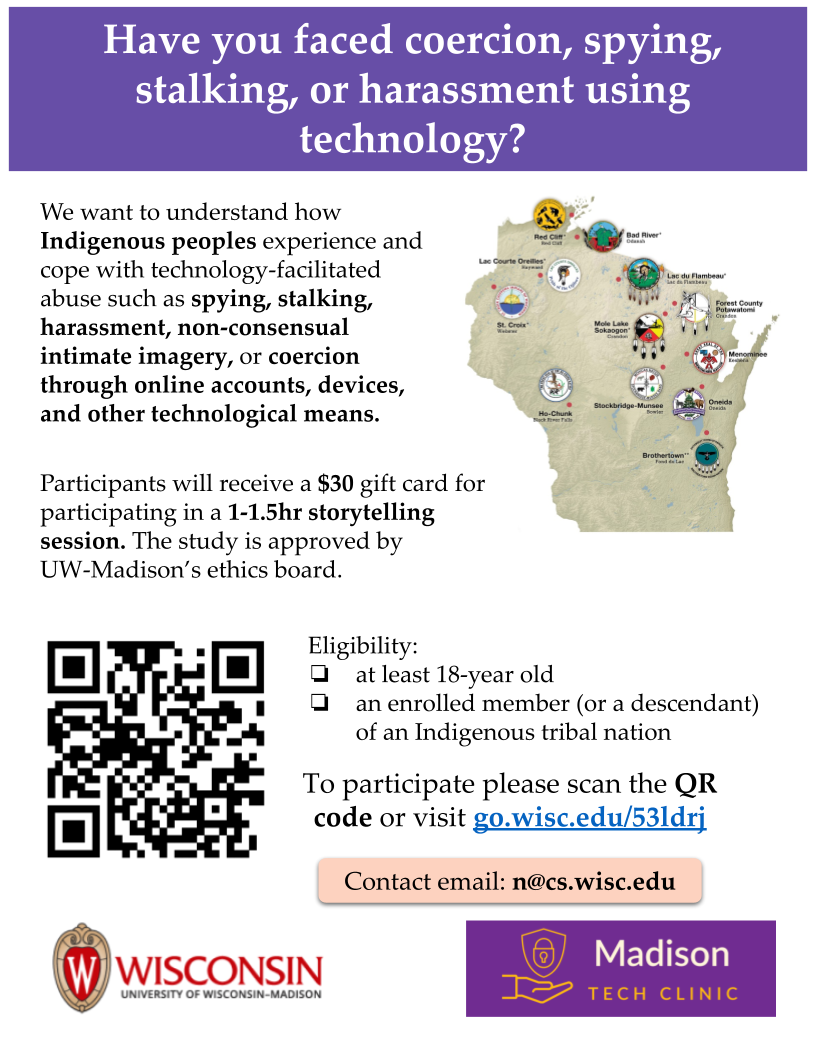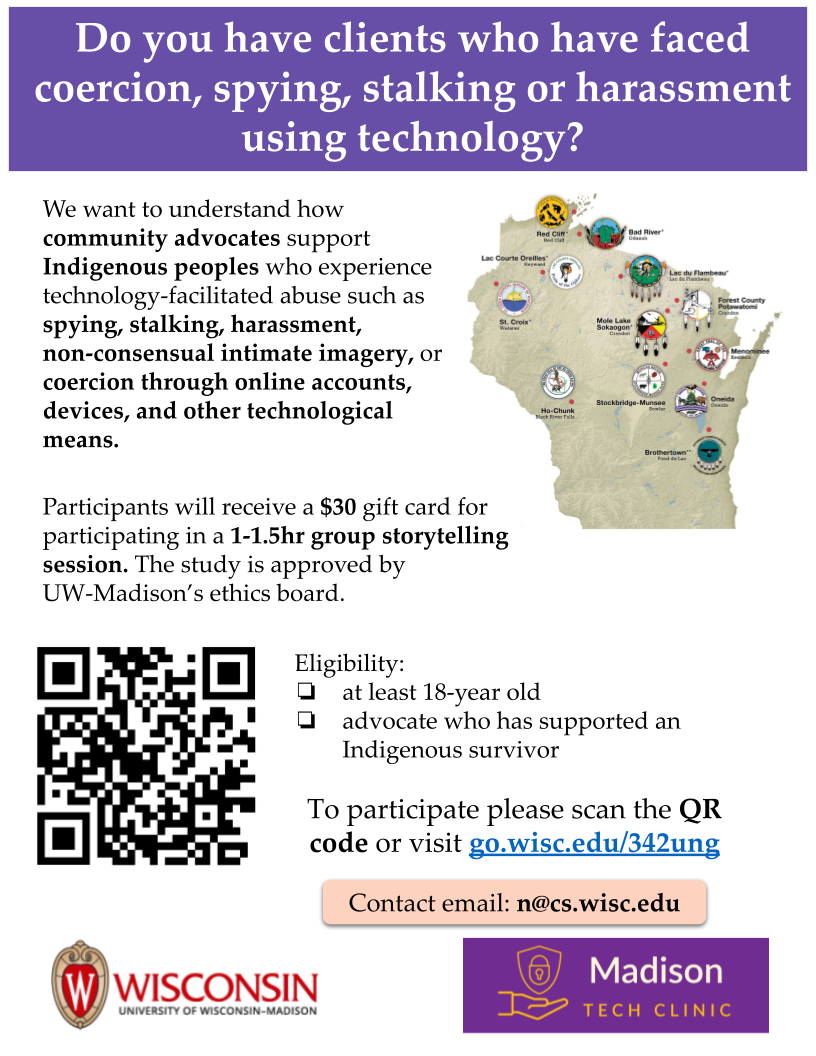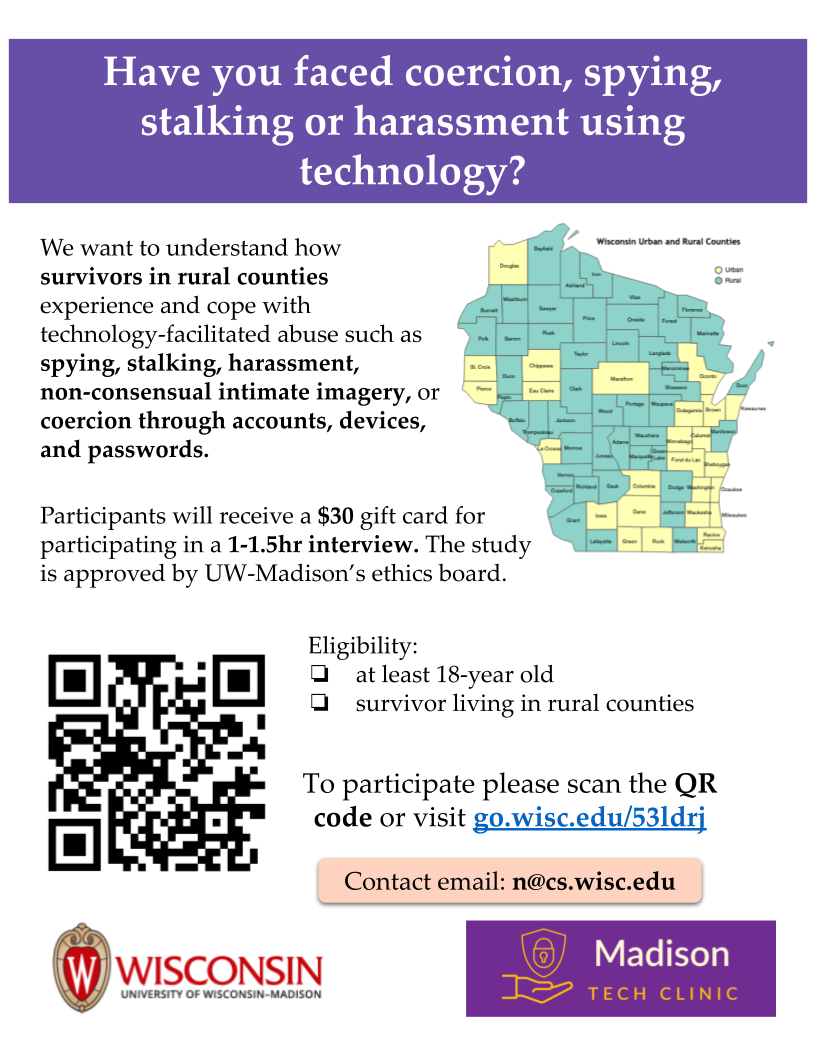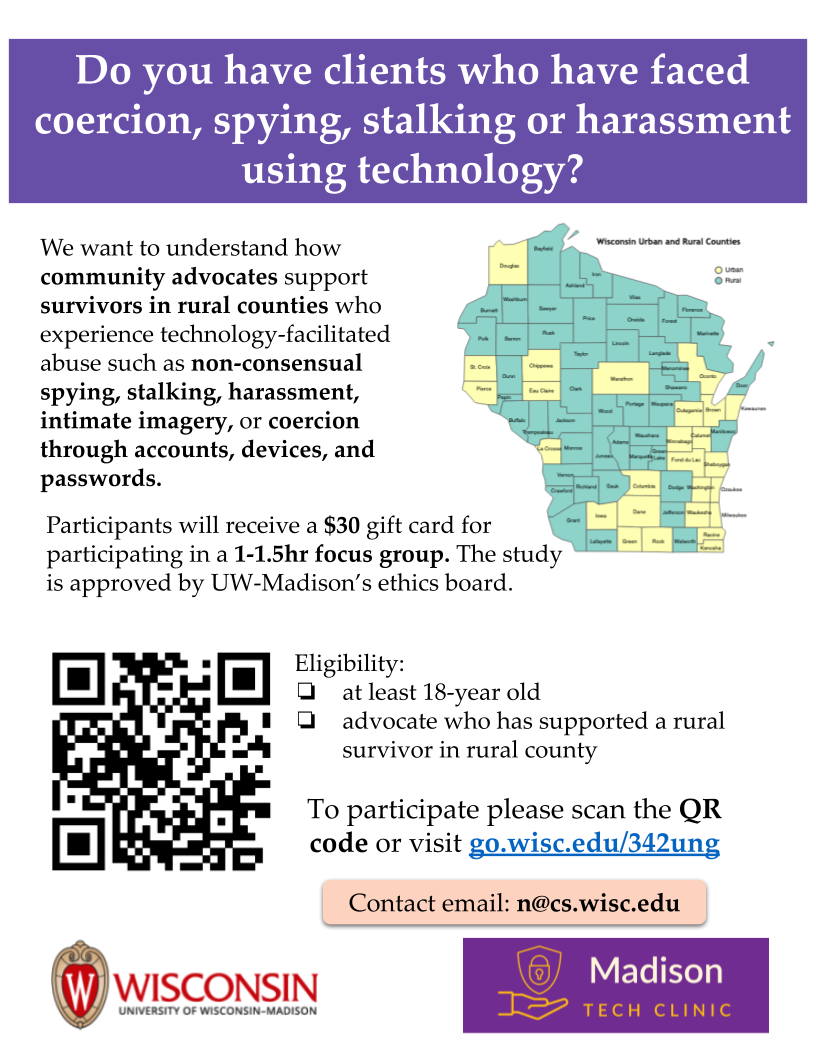Ongoing Research
We conduct research studies to better understand how people might face difficulties with technology-facilitated abuse so that we can find ways to support them. If you would like to help out with our research, please let us or your advocate know.
Healing Through Tech Agency in Indigenous Nations
We are looking to form a partnership with Indigenous nations. We would like to meet the community leaders, and we seek approval from the Tribal Council to conduct the study.
Goal: We aim to understand the challenges faced by the Indigenous survivors in seeking support. Participants will be compensated for their time and all data will be anonymized including participants’ personal information and the details of the community. We take considerable care in data collection, data analysis, and reporting the results, ensuring the utmost safety of the participants. We have obtained an exemption from UW-Madison’s Ethics Review Board and the UW Tribal Liason Office.
For more details, please visit the project page.


Understanding the needs of Rural survivors of technology-facilitated abuse
We are looking to form a partnership with DV organizations in rural counties of Wisconsin. We would like to learn from the community advocates to conduct the study.
Goal: We aim to understand the challenges faced by the survivors who live in rural communities in seeking support. Participants will be compensated for their time and all data will be anonymized including participants’ personal information and the details of the community. We take considerable care in data collection, data analysis, and reporting the results, ensuring the utmost safety of the participants. We have obtained an exemption from UW-Madison’s Ethics Review Board.


Understanding Covert Devices used in Intimate Partner Surveillance
We are actively investigating what covert devices (hidden cameras, microphones, GPS trackers) are used by abusers to surveil their partners. Moreover, we are working to develop techniques that will empower survivors of abuse to protect themselves from these devices.
Our prior work on this project involved measuring what covert devices are available from large online retailers such as Amazon, eBay, and Walmart. We found that a variety of devices are available, most of which were under $20, and some of which were actively advertising themselves as useful for spying on one’s partner. We went on to test a sample of these devices and founf that they are effective at enabling surveilance. We then repeated our search and testing method with commercially available spy device detectors and found that they were completely incapable of detecting the covert devices. More details can be found in the paper we published at USENIX Security 2023 (available here).
Present and Future Work: We are presently exploring new theoretical techniques to locate hidden spy devices. Once we have found a technique that is reliable and effective, we intend to involve survivors and advocates in a collaborative design process for the new detection tool. Our overall goal is to create a tool that can be used by as many people as possible, with as little reliance on specialized hardware as possible (i.e., the resulting tool should ideally not require a survivor to purchase anything). As such, including the target users in our design process is essential.
Publications
2025
-
Abusability of Automation Apps in Intimate Partner Violence
Shirley Zhang, Paul Chung, Nishant Korapati, Jacob Vervelde, Rahul Chatterjee, Kassem Fawaz
USENIX Security Symposium (USENIX Sec.), 2025. [PDF] -
Legal Evidence of Technology-Facilitated Abuse in Wisconsin: Surfacing Barriers Within and Beyond the Courtroom
Sophie Stephenson, Naman Gupta, Akhil Polamarasetty, Kyle Huang, David Youssef, Kayleigh Cowan, Rahul Chatterjee
ACM CSCW, 2025. [PDF] -
Hidden in Plain Bytes: Exploring Data Exports for Investigating Interpersonal Account Compromise
Julia Nonenkamp, Naman Gupta, Abhimanyu Dev Gupta, Rahul Chatterjee
ACM CCS, 2025. [PDF] -
Can Social Media Privacy and Safety Features Protect Targets of Interpersonal Attacks? A Systematic Analysis
Majed Almansoori, Rahul Chatterjee
25th Privacy Enhancing Technologies Symposium (PoPETS), 2025. [PDF] -
A Framework for Abusability Analysis: The Case of Passkeys in Interpersonal Threat Models
Alaa Daffalla, Arkaprabha Bhattacharya, Jacob Wilder, Rahul Chatterjee, Nicola Dell, Rosanna Bellini, Thomas Ristenpart
USENIX Security Symposium, 2025. [PDF] -
Digital Technologies and Human Trafficking: Combating Coercive Control and Navigating Digital Autonomy
Sophie Stephenson, Lana Ramjit, Thomas Ristenpart, Nicola Dell
ACM CHI, 2025. [PDF]
2024
-
“I really just leaned on my community for support”: Barriers, Challenges, and Coping Mechanisms Used by Survivors of Technology-Facilitated Abuse to Seek Social Support, Naman Gupta, Kate Walsh, Sanchari Das, Rahul Chatterjee. USENIX Security 2024. [PDF]
-
A Critical Analysis of the Prevalence of Technology-Facilitated Abuse in US College Students, Naman Gupta, Sanchari Das, Kate Walsh, Rahul Chatterjee. CHI Extended Abstract (LBW) 2024. [PDF]
-
The Web of Abuse: A Comprehensive Analysis of Online Resource in the Context of Technology-Enabled Intimate Partner Surveillance, Majed Almansoori, Mazharul Islam, Saptarshi Ghosh, Mainack Mondal, Rahul Chatterjee. IEEE European Symposium on Security and Privacy (EuroS&P) 2024. [PDF]
2023
-
Analyzing Patterns and Behavior of Users When Detecting and Preventing Tech-enabled Stalking, Rose Ceccio*, Naman Gupta*, Majed Almansoori*, Rahul Chatterjee. Workshop on Usable Security and Privacy (USEC) 2023. [PDF]
-
“It’s the Equivalent of Feeling Like You’re in Jail”: Lessons from Firsthand and Secondhand Accounts of IoT-Enabled Intimate Partner Abuse", Sophie Stephenson, Majed Almansoori, Pardis Emami-Naeini, Rahul Chatterjee, USENIX Security 2023. [PDF]
-
Abuse Vectors: A Framework for Conceptualizing IoT-Enabled Interpersonal Abuse, Sophie Stephenson, Majed Almansoori, Pardis Emami-Naeini, Danny Yuxing Huang, Rahul Chatterjee, USENIX Security 2023. [PDF]
-
Sneaky Spy Devices and Defective Detectors: The Ecosystem of Intimate Partner Surveillance with Covert Devices, Rose Ceccio, Sophie Stephenson, Varun Chadha, Danny Yuxing Huang, Rahul Chatterjee, USENIX Security, 2023. [PDF]
2022
- A Global Survey of Android Dual-Use Applications Used in Intimate Partner Surveillance Majed Almansoori, Andrea Gallardo, Julio Poveda, Adil Ahmed, and Rahul Chatterjee Proceedings on Privacy Enhancing Technologies (PETS) 2022 [PDF]
2019
-
Clinical computer security for victims of intimate partner violence Sam Havron, Diana Freed, Rahul Chatterjee, Damon McCoy, Nicola Dell, and Thomas Ristenpart, USENIX Security 2019 [PDF]
-
“Is my phone hacked?” Analyzing Clinical Computer Security Interventions with Survivors of Intimate Partner Violence Diana Freed, Sam Havron, Emily Tseng, Andrea Gallardo, Rahul Chatterjee, Thomas Ristenpart, and Nicola Dell Proceedings of the ACM on Human-Computer Interaction (CHI) 2019 [PDF]
2018
- The spyware used in intimate partner violence Rahul Chatterjee, Periwinkle Doerfler, Hadas Orgad, Sam Havron, Jackeline Palmer, Diana Freed, Karen Levy, Nicola Dell, Damon McCoy, and Thomas Ristenpart IEEE Symposium on Security and Privacy (S&P) 2018 [PDF]